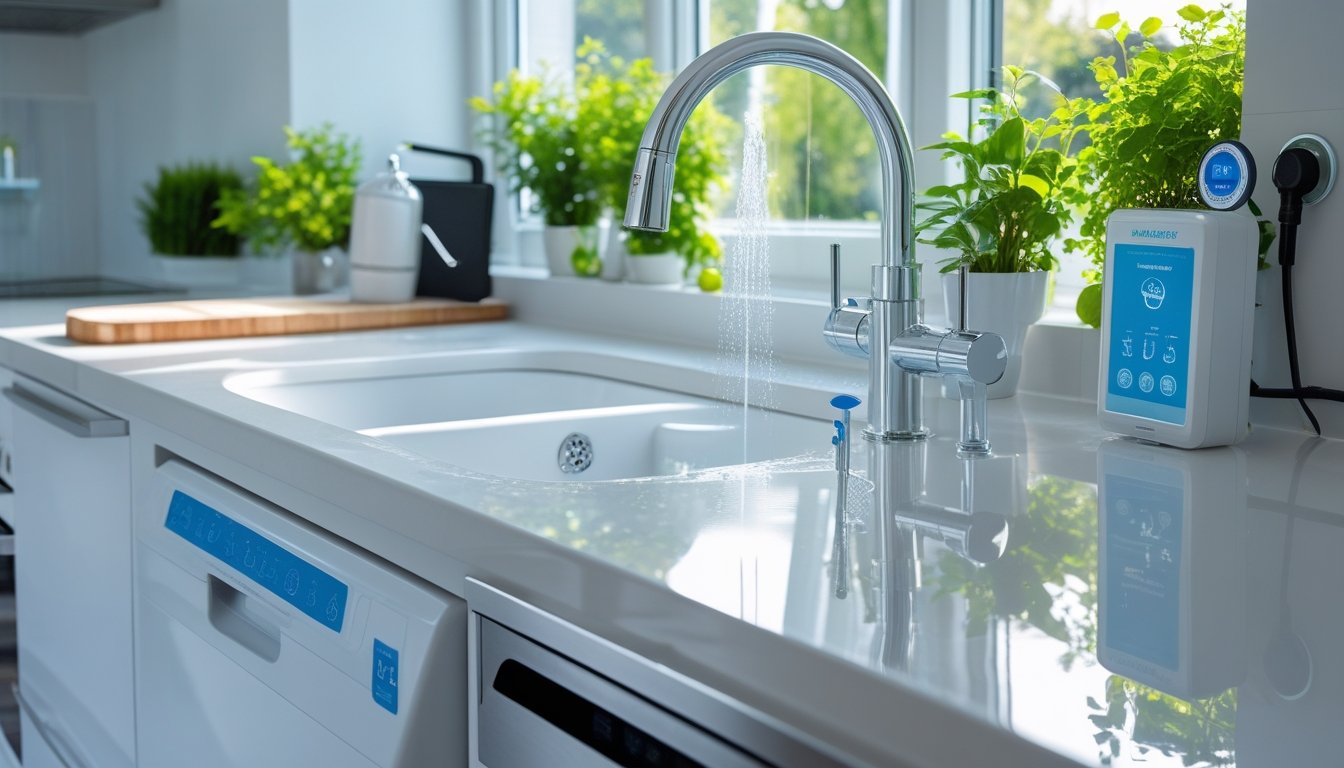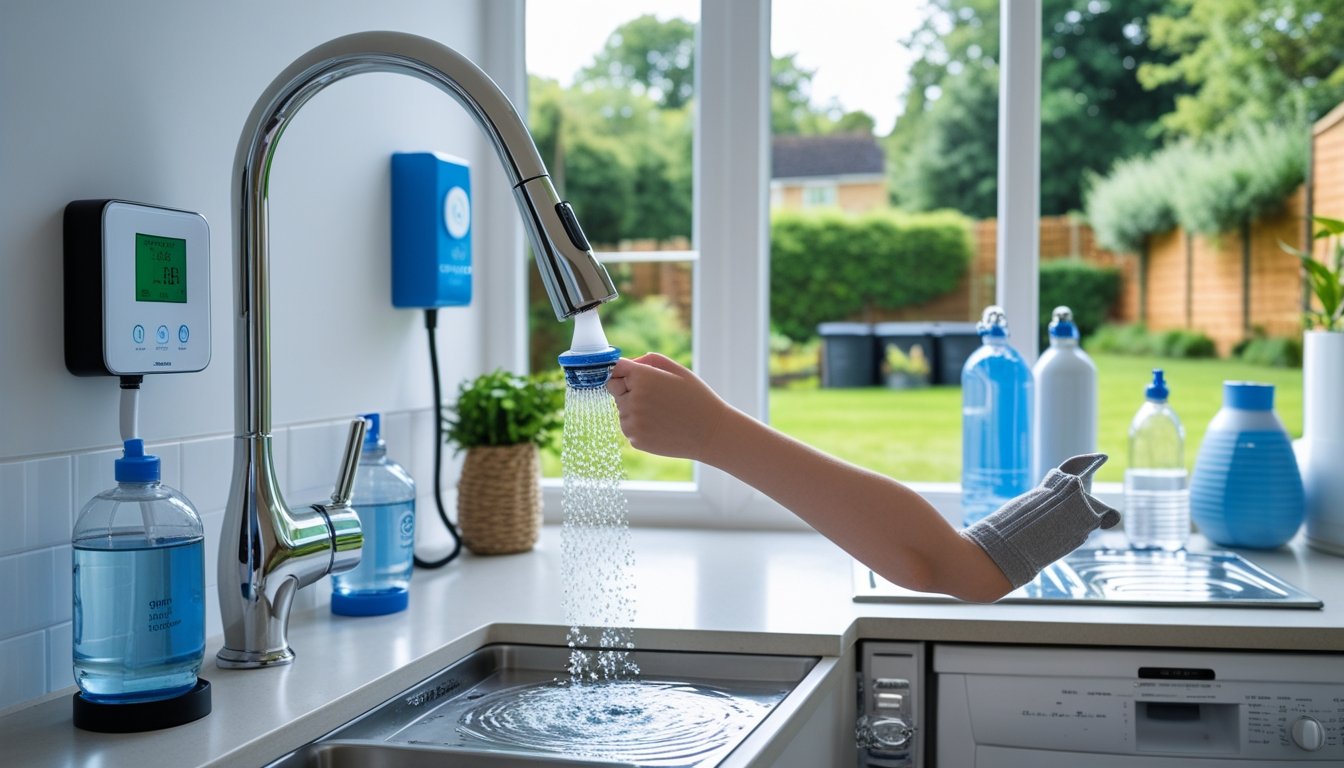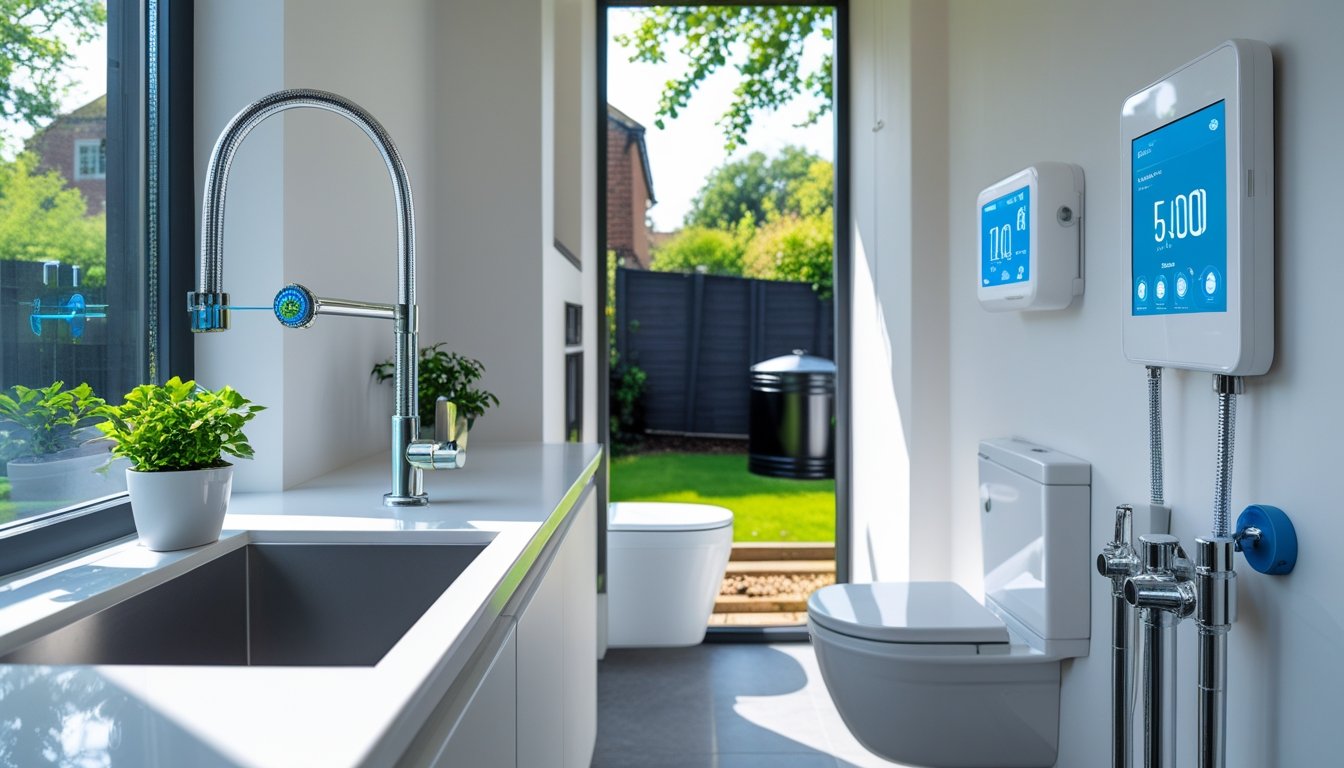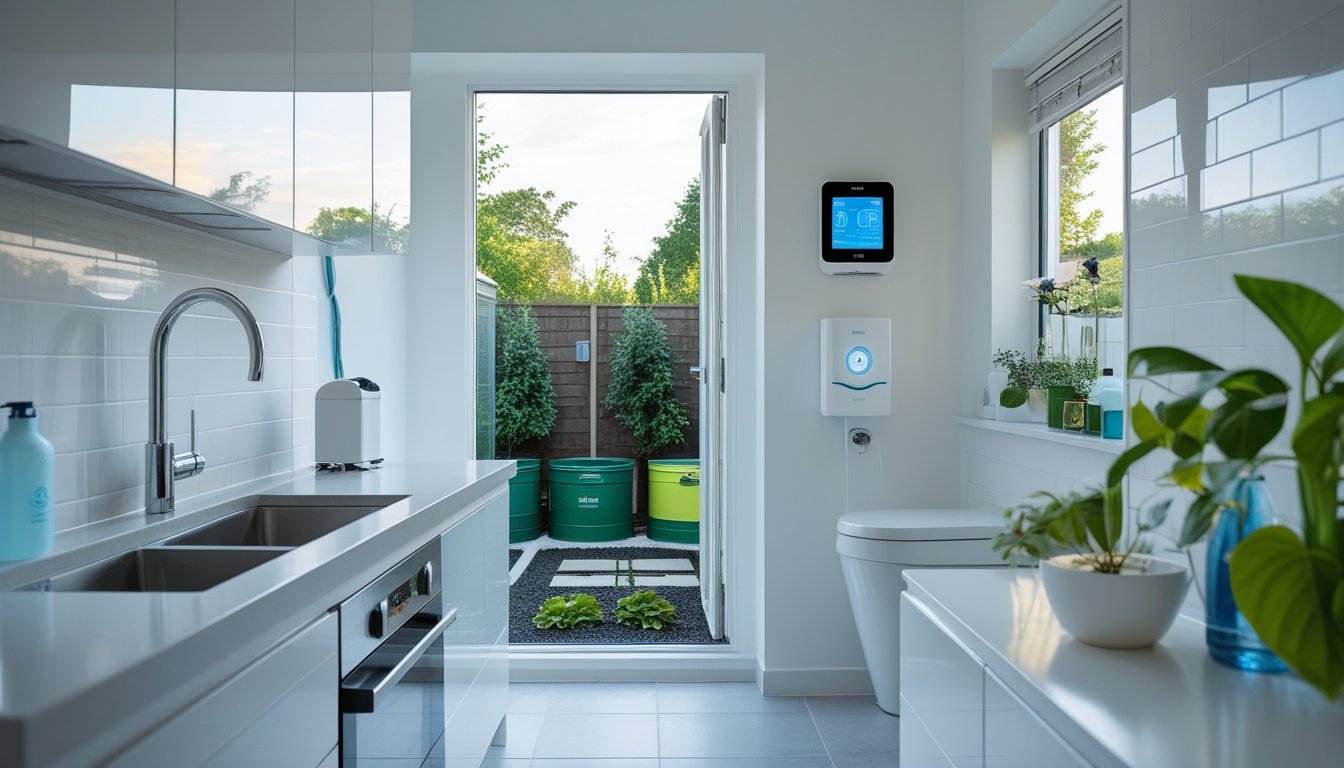Late updated: 10 Aug 2025 09:08
Written by: Eleanor Hartman
Innovative Ways To Reduce Water Usage In UK Homes: Practical Solutions For Sustainability
Water conservation in UK homes is becoming more crucial than ever, as both environmental concerns and rising utility costs drive individuals to seek innovative solutions. Our homes offer a myriad of opportunities to make meaningful reductions in water usage, some as simple as installing a dual flush toilet or embracing advanced technologies in water-saving showerheads. Innovative methods not only help conserve this precious resource but can also significantly reduce household expenses, making water conservation an excellent financial decision as well.

By taking action, we can make impactful changes that extend beyond our water bills. The integration of smart home technologies allows us to monitor usage patterns efficiently and make informed adjustments, glowing examples of future trends in home water conservation. As we explore ways to make our homes more eco-friendly, embracing these strategies can contribute positively to the environment, leading to a more sustainable lifestyle.
Key Takeaways
- Innovative methods can reduce water usage and lower expenses.
- Smart technologies enable efficient water usage monitoring.
- Eco-friendly changes contribute to a sustainable lifestyle.
Leading Strategies for Reducing Water Usage in UK Homes

Reducing water usage in UK homes requires a mix of technology and behaviour change. By implementing advanced fixtures, monitoring systems, and encouraging conscious habits, we can effectively minimise water consumption and help conserve this vital resource.
Adopting Water-Efficient Fixtures and Appliances
Installing water-efficient fixtures and appliances is one of the most effective methods we can use to reduce water usage. Low-flow taps, dual-flush toilets, and aerated showerheads significantly lessen water flow without compromising performance. Appliances with high efficiency, like dishwashers and washing machines rated for water conservation, can also make a considerable impact.
Replacing older models with these efficient alternatives is not only cost-effective in the long run but also critical for improving household water efficiency. By prioritising technology that reduces consumption, we help the environment while potentially reducing household bills.
Integrating Water Meters and Monitoring Usage
Tracking usage through water meters can lead to greater water conservation at home. By providing real-time data on household water consumption, smart meters empower us to identify excessive use and take corrective action.
Monitoring usage allows households to set targets and measure progress in reducing water consumption. Many smart meters come with online platforms where we can view data and receive alerts for unusual spikes in usage, prompting quicker responses to leaks and wastage.
Innovative Water-Saving Technologies and Devices
Adopting innovative water-saving technologies can revolutionise our water usage. AI systems now optimise water distribution by analysing consumption patterns and suggesting personalised usage plans.
Sensor-based systems, irrigation timers, and greywater recycling units help minimise unnecessary wastage. These tools not only conserve water but also maintain home comfort and convenience. By integrating these systems, we ensure sustainable management of water resources while enhancing domestic water efficiency.
Behavioural Changes for Daily Water Conservation
Simple behavioural tweaks contribute significantly to reducing water consumption. Encouraging family members to take short showers, turn off the tap while brushing teeth, and only run appliances with full loads can save vast amounts of water annually.
Public awareness initiatives can motivate collective action, encouraging an eco-friendly mindset. By fostering lifelong learning about the value of water and employing mindful practices in our daily routines, we enhance water conservation efforts that benefit both the household and the broader community.
Emerging Approaches and Future Trends in Home Water Conservation

Incorporating innovative water conservation strategies into our homes is becoming increasingly essential. These approaches not only ensure sustainable water consumption but also leverage technology to create more efficient living spaces.
Greywater Recycling and Rainwater Harvesting Solutions
Greywater recycling and rainwater harvesting are two promising methods that allow us to reutilise water effectively. Greywater systems collect wastewater from baths, sinks, and washing machines, which can then be treated and reused for toilet flushing or garden irrigation. These systems significantly reduce the demand for fresh water and help conserve vital resources.
Rainwater harvesting, on the other hand, involves capturing and storing rainwater from rooftops. This water can be used for non-potable purposes such as washing cars, watering plants, or even flushing toilets. By implementing these techniques, we can decrease our dependence on municipal water supplies and promote sustainable water management in our homes. Together, these solutions provide practical ways to maximise water efficiency.
Designing Homes for Maximum Water Efficiency
Building and renovating homes with water efficiency in mind require strategic planning and design. This can involve installing low-flow taps and showerheads, dual-flush toilets, and water-efficient dishwashers and washing machines. These features are designed to use significantly less water without compromising performance.
Incorporating permeable pavements and drought-resistant landscaping further enhances efficiency by reducing runoff and lowering water consumption in gardens. Additionally, selecting building materials with low water footprints contributes to an eco-friendly home environment. By focusing on these water-efficient designs and practices, we can minimise wastage while maintaining a comfortable and functional living space.
Smart Home Systems for Water Management
Smart home technology is transforming the way we manage water usage. Systems equipped with sensors and data analytics help monitor water consumption in real-time, alerting us to leaks or inefficiencies. This proactive approach can lead to substantial savings on water bills.
Devices such as smart irrigation systems automatically adjust watering schedules based on weather conditions and soil moisture levels. These innovations ensure gardens receive only the necessary amount of water, preventing over-irrigation. Additionally, smart appliances like water-efficient dishwashers and washing machines can further optimise our overall water usage. By integrating these smart systems, we empower ourselves to manage water more effectively and sustainably.
Frequently Asked Questions

In the context of UK homes, understanding and implementing water-saving practices is key. From effective conservation techniques to the utilisation of water-efficient devices, a myriad of strategies can help UK residents achieve sustainable water usage. Below, we address common inquiries concerning water conservation efforts applicable to UK households.
What are some effective water conservation techniques that can be implemented in UK households?
We can adopt rainwater harvesting systems which capture rain for use in gardens and toilets. Fixing leaks promptly and installing aerators on taps can also conserve water. Simple actions like using a watering can instead of a hosepipe for gardens help reduce consumption significantly.
How can UK homeowners modify their daily routines to achieve lower water consumption?
By taking shorter showers and turning the tap off while brushing teeth, we can cut down water use. Running dishwashers and washing machines with full loads instead of half can also help. Collecting water used for rinsing fruits and using it for plants contributes to reducing wastage.
Which water-efficient devices are recommended for reducing water usage in UK homes?
The installation of dual-flush toilets can save litres of water per flush. Water-efficient showerheads and tap aerators reduce flow without compromising performance. Smart meters allow us to monitor usage closely, helping in identifying areas for improvement.
Are there any government-initiated water-saving schemes available to UK residents?
Government schemes such as the Water Efficiency Labelling system provide information on the water usage of appliances, helping homeowners make informed choices. Regional water companies often provide free water-saving kits, offering practical tools like shower timers and toilet cistern bags.
What role do garden and lawn-care practices play in household water conservation in the UK?
Choosing native or drought-resistant plants reduces the need for watering. Implementing mulching techniques, which retain soil moisture, is beneficial. Minimising lawn areas with paving or decking where appropriate can decrease water consumption linked to outdoor spaces.
Can you list daily household chores that can be altered to conserve water in UK residences?
We can opt to hand-wash dishes in a basin rather than under running water. Utilising dishwashers optimally saves water. Cooking water can be reused for watering plants, and thawing food in the fridge instead of under running water can prevent wastage. Adding these small changes to daily chores enhances conservation efforts.